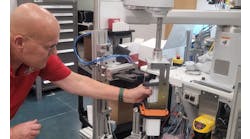This Control Talk column appeared in the April 2022 print edition of Control. To read more Control Talk columns click here or read the Control Talk blog here.
Greg: Miami University of Ohio has started an extracurricular training program, mainly aimed at workforce development—to reduce the skills gap in the area of controls and automation. This program was developed in a collaboration between the Department of Chemical, Paper and Biomedical Engineering and the Paper Science & Engineering Foundation (PSEF), with the recognition that graduating engineers will enter Industry 4.0.
The program includes a three-week, intensive workshop (about 45 hours) for students to learn control techniques and practice them in the lab. Participants in the course are hired for internships with sponsoring companies. The students have both an interest in control careers and a practicable viewpoint to take into internships and careers. Russ Rhinehart has taught some of the segments, so have others with substantial application experience. Plus, the faculty participants have industrial experience. The program is called the Systems Automation Springboard to Internships (SASI).
Gary Rudemiller, the executive director of the foundation; Doug Coffin, the faculty member who developed the concept; and Jason Berberich, the lead faculty instructor of the workshop offer key aspects of this exemplary program direly needed to advance the automation profession.
Doug, how do you prepare students for control careers?
Doug: At Miami University, we have a minor in process control, and our majors in chemical, biomedical and mechanical engineering all take courses in controls, but they don’t delve into the subject until their senior year. This means internships in this area aren't as effective as they could be, and students lose interest in controls. We developed SASI to help prepare mainly sophomore students in the areas of process control and automation, so that when they enter their internships, they'll be more cognizant of technical aspects of control, which will improve their experience and more likely lead them to a career in the controls arena.
Greg: How do you recruit students?
Doug: We first offered SASI during our winter term of 2021. We recruited by word of mouth, with special emphasis placed on recruiting process control minors. In our pilot program, we had eight students, seven of which were process control minors. For 2022, we recruited students using posters, a webpage, and visiting engineering classes. We had 31 students express interest in participating in the program, and included their resumes in the booklet sent to potential sponsoring companies for the internships. Our best recruiting tool is the testimony of previous participants to their peers.
Greg: What are the benefits for students?
Doug: SASI prepares students for the industry they'll be entering for their careers. As automation increases, the ability of engineers to utilize control systems and make effective use of big data will be essential skills. The workshop provides an immersive experience in this field, so students will be much better prepared for their internship and have practical experiences to connect to future coursework.
Greg: Who funds the SASI workshop?
Doug: The main source of funding for the workshop is direct sponsorship of the student by the company hiring them for an internship. We set the workshop fee at $1,500 per student. Sponsoring companies interview the students, and make an internship offer to students they select. If the student accepts the offer for the summer internship, the company pays the $1,500 workshop fee. For the first two years, we also received funding from Miami’s Career Services via a grant. In the first year, we also received funding from the department and the engineering division. For 2022, we had 17 students, who accepted internships and were sponsored by companies. We had two additional interested students participate without an internship.
Greg: Why did you start the SASI program?
Gary: My background is the paper industry, so I’ll speak for its needs. However, I suspect this parallels the experience of almost any process manufacturing industry. For many years, companies weren't able to hire enough talent in the controls and automation arena to design, maintain and optimize these systems. The situation only became more dramatic as Industry 4.0 accelerated in the manufacturing arena. Students who participate in the SASI workshop are primed to have a successful experience in their internships, which will create a positive tone in how these students perceive a career in controls and automation. There is tremendous need for engineers who are Industry 4.0 capable, and these graduates will set themselves up to successfully fill the needs of any manufacturing company.
Greg: For success, what are the essential attributes in the leaders and the organizations?
Gary: Leaders in these manufacturing organizations by and large recognize the challenge that an Industry 4.0 manufacturing environment presents to their talent needs. The challenge they face is sourcing talent with the necessary skills. There aren’t enough controls and automation practitioners in industry to satisfy the hiring needs, and universities aren't graduating the talent. Some companies are left to groom and train talent in-house. Some companies have very effective training programs, and others search for external means to address their needs. The companies that partnered with us as SASI sponsors recognize the potential for this workshop to create a pipeline of Industry 4.0-capable talent for them. The leaders with the vision to implement paths to address this skills gap will situate their companies for a more efficient and successful manufacturing platform. We offer SASI as a path to solving the skills gap for our sponsoring partners.
Greg: What topics are in the course and labs, and how are the topics selected?
Jason: The curriculum for the workshop was put together by Miami Paper Science and Engineering alum Pat Dixon, who has worked in industrial automation as an engineer and a project manager. The curriculum is organized so all of the material can be covered in the three weeks of Miami’s winter term. The curriculum starts with fundamental topics and builds to more advanced and detailed discussions, with most of the topics presented in blocks lasting from one to two hours. A unique aspect of the program is the mix of instructors from academia and industry. Eight industrial practitioners with varying expertise present almost half of the workshop’s content.
Topics that are covered in the course include background on the components of a control system, an introduction to dynamics, and a discussion about PID control. However, what makes this program unique is the material presented that isn't typically covered in a traditional engineering program. This includes topics beyond PID control such as ratio, cascade and feedforward control, model predictive control (MPC) and multiple-input and multiple-output (MIMO) control.
Additional content includes field signals, interlocks and permissives; components of industrial control systems such as the HMI, the historian, DCS and SCADA; and an introduction to batch control. A number of lab exercises provide practice in preparing and interpreting PFDs and P&IDs, performing linear and non-linear regression, fitting data to FOPDT and SOPDT models, tuning of PID, cascade and feedforward controllers, and programming PLCs and HMIs. The breadth of focused automation and controls material covered along with industry- and job-specific examples with context is truly unique and unusual for any program in the U.S.
Greg: I had a wild idea a couple of years ago after creating some digital twin labs and giving some guest lectures at the Missouri University of Science and Technology. I came up with a program for a virtually taught master’s degree in process control that had 12 required and 12 elective courses based on what is needed in the process industry to increase innovation and realize the benefits of basic and advanced process control. The idea was that key resources in the ISA Mentor program, and contributors to the latest McGraw Hill Process/Industrial Instruments and Controls Handbook, 6th Edition, would be the instructors. I realize these people are too busy, but they could provide guidance to recent university graduates with some practical experience—possibly by internships—to become adjunct professors who would actually teach the lectures. Download a proposed list of courses in the online document “Proposed Curriculum for a Master’s Distance Degree in Process Control”. The program would need sponsorship by industry. This may be too ambitious. A concise version of the program could possibly be done in a matter of months.
10. More precise valves giving more precise Industry 4.0 data
9. More accurate sensors giving more intelligence in Industry 4.0 data
8. More time to explore and innovate seen in complementary Industry 4.0 data
7. More feedforward control to improve feedback from Industry 4.0 data
6. More cascade control to reduce distractions in Industry 4.0 data
5. Better tuning to reduce fluctuations in Industry 4.0 data
4. Better pairing of variables to improve predictions in Industry 4.0 data
3. Adding valve position control to improve your position from Industry 4.0 data
2. Adding online metrics to increase bonuses from Industry 4.0 data
1. Reducing deadtime to decrease the time between promotions and bonuses







